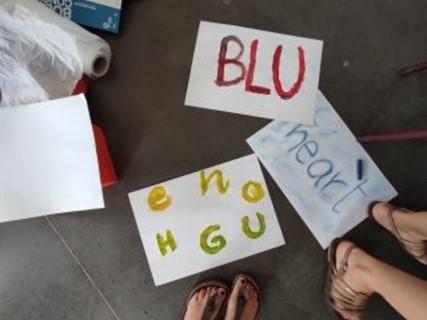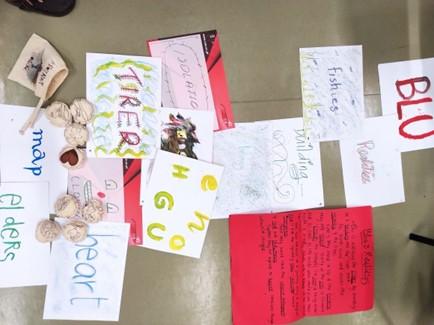Bear, Eagle, Salmon and Mole land in Coimbra, Portugal
September 5, 2022
By Arianna Porrone
Matter commented on: A workshop on collective storytelling at The Pluriverse of Eco-social Justice summer school (Center for Social Studies, CES, Coimbra, Portugal)
Pdf version: here
The story and the story teller both serve to connect the past with the future, one generation with the other, the land with the people and the people with the story – Linda Tuhiwai Smith (2021)
With A Story About Knowledge we are continuously testing the power and beauty of collecting and telling stories, gathering together in a circle, and opening our hearts to unexpected outcomes. The handbook is indeed a special means to enter in touch with communities – be they indigenous peoples, researchers, academics at any level of their career, and children. It offers the chance, for readers and listeners, to connect to their past, collect ideas, dreams and memories and bring them to the present. In this way, knowledge really does become a living system, continuously refreshed by new and old perspectives and never stagnant. With stories, anyone can “feel at home”, at ease.
For all these reasons, we argue, stories and storytelling are the antidotes to a crisis of imagination, which nowadays reduces the horizon of solutions available to solve the socio-ecological urgencies of our time.
This summer we brought Bear, Eagle, Salmon and Mole to The Pluriverse of Eco-social Justice summer school, co-coordinated by the Oficina de Ecologia e Sociedade (ECOSOC) at the Center for Social Studies (CES, Coimbra, Portugal) with the COST Action "Decolonizing Development" (DECOLDEV), and with the support of the H2020 projects "Just transition to the Circular Economy" (JUST2CE); "The Rise of Citizens Voices for a Greener Europe" (PHOENIX); “Animals and Plants in Cultural Productions about the Amazon River Basin” (ECO) and "Prince Claus Chair in Equity and Development 2019-2021" (PCC).
A Story About Knowledge inspired a workshop on “RE-PUZZLing, Doing StoryTelling” where a group of brave young scholars co-created and performed a pluriverse of solutions to respond to eco-social struggles linked to extractivism, environmental degradation, and social injustices in the form of a story.
The workshop, took place on July 15th, day 5 of the Summer School which revolved around “Performing Citizenship”. Inspired by the participatory action research methodologies (PAR), it was co-created by Arianna Porrone, Irina Velicu (CES, Coimbra), and Alice Iancu, during long phone calls and meetings between, Romania, Portugal and Italy. It was then conducted by Arianna Porrone and Alice Iancu horizontally with the participants. The participants, coming from many different parts of the world, including the Philippines, India, Romania, Italy, the UK, and Spain, were asked to think of 3 or 4 words connected to the broader topic of the summer school and write/paint them white posters. Then, after sharing thoughts and emotions on their choices and the memories and senses linked to them, they were encouraged to re-puzzle their own words with those of the others, so as to make connections and collectively create a story. The result was “Blu’s realities”, a story about Blu, a red cat watching the “fishies” (the small fish in the words of the participants) by the river bank. Tired of being alone, Blu embarks on a journey using a magical map, together with a kind clown with a heart on her sleeve. The two learn the creative pedagogies of land and food sharing and eventually boycott loneliness through a collective struggle. What better way to explore the many unexpected ways of solidarity, care, love and compassion than through a story, which contains the story of each one of the participants in the workshop, along with the reflections that emerged throughout the summer school?

Picture 1 By Arianna Porrone: The workshop's materials

Picture 2 By Arianna Porrone: Arianna's words

Picture 3 By Arianna Porrone: The final result
References
Chambers, R. Participatory workshops: A sourcebook of 21 sets of ideas & activities. (Earthscan 2002).
Freire P. 1921-1997. Pedagogy of the Oppressed. (Continuum, 2000).
Kothari A., Salleh A., Escobar A., Demaria F., Acosta A. (eds.) Pluriverse. A post-development dictionary, (New Dehli: Tulika Books 2O19).
Tuhiwai Smith L. Decolonizing Methodologies: Research and indigenous peoples. (Bloomsbury Publishing 2021).
Porrone, A.; Poto, M.P.; Russo, V. A Story about Knowledge. (Aracne 2021).
Porrone, A.; Poto, M.P.; Russo, V. A Story about Knowledge. The Illustrated Version (Aracne 2021).
Rose G. Visual Methodologies. An introduction to the Interpretation of Visual Materials (SAGE Publications 2001)
***
This post may be cited as: Arianna Porrone, “Bear, Eagle, Salmon and Mole land in Coimbra, Portugal” (September 5, 2022), on-line: here